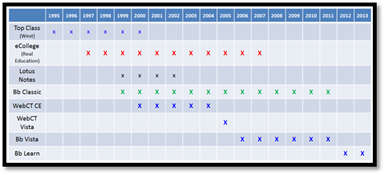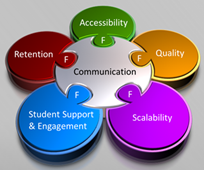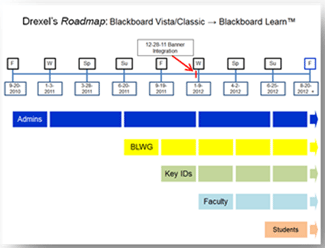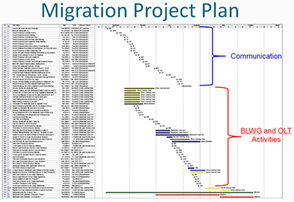Key Takeaways
- To achieve its goal of making IT the foundation for all academic and administrative efforts, Drexel's IT leadership realized that it needed to move from a participant to a leadership role on its Online Learning Council.
- The reinvention of Drexel's Online Learning Council presented a strategic opportunity to achieve that vision.
- Assuming the position of thought leader, collaborator, and point person required the new OLC Executive Director to address varied views and misconceptions about IT's role in the institution and bring people together.
- The director's successful first year included several meaningful outcomes, including migrating the university to a single learning management system for the first time in its history.
Drexel University comprises 14 colleges and schools (the academic units) and myriad administrative units. To realize the university's mission via its strategic plan to transform the modern urban university, key IT and academic thought leaders realized that IT at Drexel must bridge these academic and administrative constituencies in order to become more effective. That is, IT must move past offering only core applications and infrastructure support to leverage its relationships and emerge as a full partner in the overall academic enterprise. Ultimately, Drexel's goal is for IT to become a broad-based foundation, not only for the IT plumbing, but for everything that happens on both the academic and administrative levels now and well into the future. To that end, the CIO (co-author John Bielec) notes, "IT having a seat at the table is no longer the end goal; IT must provide leadership in leveraging the university's technological environment as well as envisioning and championing its future." A dual-role position combining technology and academic experience in one person addressed this urgent issue.
Innovation via the Online Learning Council
In 2009, Mark Greenberg, Drexel's provost, concerned about course quality – specifically as it related to Drexel's online offerings – challenged Jan Biros, a senior vice provost, to develop ways to examine the issue. Jan envisioned an Online Learning Council (OLC) that would focus on quality but also retention, scalability, and student support. Later, the OLC itself added critical focal points of accessibility, academic integrity and honesty, along with communication. Once formed, the OLC grew to include representatives from every corner of the university community. The council quickly became a multifaceted and vibrant entity. Its initial achievements included creation of the INSPIRE website, DrexelExpress [http://www.drexel.edu/provost/drexelexpress] for online students, and a similar site for online faculty [http://www.drexel.edu/provost/drexelexpress/faculty/]. The OLC envisioned and sponsored open events such as Evidence-Based Learning: Creating a Culture of Assessment [http://www.drexel.edu/inspire/events/overview/evidence-based-learning/], with follow-up events like their MOOC Symposium in August 2013 and Evidence-Based Learning: Insights and Experiences in September 2013 and Drexel's inaugural and regional Conference on Learning and Assessment, scheduled for September 2014. Future council plans include partnering with the Quality Matters organization in hosting their regional conference at Drexel in the spring of 2015.
The OLC's passionate members impressed leaders in both academic and administrative circles, and the council's mandate expanded to include areas such as academic honesty and integrity, communication, and massive open online courses (MOOCs). Projects here included both the forthcoming MOOC Symposium and subgroups examining how to address the well-publicized challenges of cheating in online courses.
Co-author Michael Scheuermann explains technology solutions for academic honesty and integrity (1:00 minute).
To continue being effective in its endeavors, provost Greenberg and CIO Bielec recognized that the OLC had to reflect the structural and cultural changes that emerged from its efforts, i.e., independent of hierarchical or strictly departmental reporting relationships. The OLC committees have collaborated effectively in myriad small and larger, more significant initiatives, all focused on faculty and students. The critical factor for the OLC has been the tight and active collaboration between academics, support professionals, administrators, and those skilled in existing and emerging technologies. Together they have forged new alliances and fostered cross-unit conversations that are future-facing and end-user-centric. Formerly disparate and disjointed efforts have become joint efforts that leverage the best-of-the-best that the separate units had to offer — but packaged in a new way. Central to this success was moving IT from a participant role to a leadership position. To that end the CIO and the provost recommended that an individual from the IT organization take on a dual role: both leading the council and bringing its goals and participants together as the new OLC Executive Director.
Implementation of the New Position
This dual-role position became a reality in January 2012, when Drexel's provost and its CIO co-sponsored and co-funded the Executive Director – Online Learning Council position, appointing co-author Michael Scheuermann to the role. After a successful inaugural year, the position was renewed for two additional years. One critical success factor was Scheuermann's IT experience combined with significant academic underpinnings.
Scheuermann provides an overview of the OLC (5:31 minutes).
Having someone fill this position — as thought leader, collaborator, and point person — led to meaningful outcomes, among them the university's migration from multiple learning management systems to a single LMS for the first time in Drexel's history. (Figure 1 shows Drexel's LMS usage/journey since 1995, when Top Class was in use.) When Drexel reached the point where its faculty and students were using just two major LMSs for their teaching and learning, Senior Associate Provost for Academic Affairs John DiNardo made it a personal mission to find a way for the university to "get onto one system." Only one of the LMSs was integrated with the student information system (SIS), so when DiNardo wanted to examine student success and persistence, to cite just one example, there was no way for him to view these KPIs in an apples-to-apples manner. Now on a single system, Drexel is piloting Inside Track for student coaching, Course Signals [http://www.ellucian.com/signals/] for early-warning alerts for at-risk students, and Analytics for Learn to provide educators and administrators — as well as the students themselves — early insight into in-course performance. Beyond this definitive core benefit, the most significant metric indicating the impact of being on a single system was that Drexel experienced 17 million log-ins to its LMS in the first complete academic cycle since the migration. This was a marked increase in LMS adoption and usage from Drexel's past — by a factor of three.

Figure 1. History of LMS use at Drexel, 1995–2013
OLC leadership (certainly with a nod to strong and ongoing guidance from the IT and academic co-sponsors) focused on ensuring:
- regular OLC-wide meetings,
- regular committee meetings and those of their smaller working (project-based) groups,
- establishing eight OLC Fellows positions, and
- tracking projects, plans, and deliverables through regular report-outs, workshops, faculty showcases, courses in the LMS, and conference presentations, along with the Drexel-sponsored/hosted events.
Challenges and Resolutions
The challenges, both political and historical, in establishing a formal leader for the OLC involved appointing someone with ties to both the IT and the academic sides. They largely related to how individuals throughout the Drexel community viewed the role of central IT. Broadly speaking, some in academe view IT staff as providers of core technology and support and thus necessary for conducting the institution's business. Some departments erroneously view IT staffers as centralizers and controllers of technology across campus. Others view IT as a necessary evil, where sometimes things work and sometimes they don't. In her book The CIO Paradox, Martha Heller pointed out that when IT works well, no one notices — but when some system experiences difficulty, everyone looks critically at central IT.1 Others in higher ed fail to realize the core elements that IT brings to academics, research, outreach, engagement, and meaningful work across the institution. In the May/June 2013 EDUCAUSE Review, Mark Askren, CIO at the University of Nebraska–Lincoln, wrote that "…the opportunities for CIOs to make a difference at their institutions has never been greater."2 We agree, and having even a part-time academic who understands the end-user community while concomitantly living full-time on the support and infrastructure side enables an OLC-type organization to keep its collective eyes on both camps.
Early Successes
Early on, as the OLC was forming, it became apparent that there were pockets of excellence scattered about various administrative and academic units at Drexel, but few of them knew of the existence of the others. Early conversations between the OLC committees and members, championed and often facilitated by the executive director, enabled some of these opportunities to surface. The challenge then lay in determining how to gain leverage from these small successes and convincing their creators to share them more widely (and freely).
In the case of creating a student orientation for online students, existing unit-specific offerings were used as foundations for an OLC committee's working group to create a generic offering built on the best that existed yet flexible enough that its template could be customized for units that had none in place. The same was true for creating a broadly available foundation course for new online instructors. On the other hand, when the OLC created its accessibility and scalability online courses, no such foundation or template existed, but these OLC working groups uncovered and used existing elements while creating new modules and components to fill gaps.
Structured to Support Achievement
Most past as well as ongoing accomplishments took place because — for the first time — an organized, cross-departmental group focused on what was best for the university and its end-user community. The structure of the OLC played a large part in its achievements: eight OLC Fellows and six committees (figure 2) that form working groups or task forces when focused on deliverables and projects. The Fellows focus, in part, on reviewing course design, communicating with all of Drexel's academic units, and coordinating the efforts of the OLC committees. Monthly OLC meetings are transparent and enable any and all OLC members to explain, showcase, and seek feedback on their current efforts. Most committees have the same monthly meeting schedules, where members operate autonomously and remain mindful of their mission to find and leverage any pockets of excellence within Drexel in their particular committee's area. Collaboration is a core competency of the OLC and its Fellows and committees. The executive director can thus perform primarily as a facilitator and public spokesperson for the group.

Figure 2. OLC committees
The dual-role position was the linchpin that let the OLC tackle these challenges and leverage key opportunities. Leading the energized, inclusive OLC, the new executive director leveraged relationships across the institution — often longstanding ones largely unnoticed by the community. In many cases, duplicate efforts were uncovered, used as learning moments, and avoided going forward. In other cases, the OLC discovered initiatives, work products, and resources trapped in silos but badly needed in other units. The OLC's Student Support and Engagement committee found department-specific student support efforts that ranged from outstanding to completely inadequate. They worked hard to canvas the landscape, uncover pockets of excellence, showcase the-best-of-the-best, identify need areas, and plug gaps with shared resources made available only because of their effort and diligence. The payback for the authoring unit was public acknowledgment of their considerable accomplishments and willingness to share.
Impact on Drexel

Figure 3. Drexel's LMS migration roadmap
Migrating to a single LMS, Blackboard Learn, for the first time in the university's history was the first truly major project for OLC under the direction of its new executive director. To facilitate the migration to that single LMS, an ambitious roadmap (figure 3) — conceived and documented 18 months before the Learn go-live date of June 23, 2012 — served as the guide and project plan foundation. To mirror the OLC on the (mostly) academic side, the OLC executive director in 2011 recommended formation of a Blackboard Learn Working Group (BLWG) for the administrative and technical sides, with members pulled from across campus. During the migration, the university had to move thousands of courses from the older systems and reconstruct hundreds of others while adhering to the Drexel Roadmap. During the LMS migration, communications from the OLC, its executive director, and other campus groups ensured that every level of the Drexel community remained informed on the project's progress, challenges, and myriad related issues.
Key to the migration was early and ongoing communication from the executive leadership levels on down, spearheaded by the executive director's project plan focus (figure 4), which Scheuermann showcased to the president's cabinet, deans' meetings, executive council, and on down through the Drexel hierarchy so that all academic and administrative leaders would learn of this significant project, early on. If they had concerns, comments, ideas, or objections, the executive director handled those as the key contact and responsible party.

Figure 4. The OLC Executive Director's project plan for the LMS migration
Following successful implementation of the LMS, interest in the OLC's undertakings has heightened from the Drexel Board of Trustees and Drexel President's Cabinet down through every academic unit at the institution. For example, several trustees have expressed concern about honesty and academic integrity in online courses, and the president (like many of his colleagues) is interested in learning more about the MOOC (massive open online courses) movement. As a result, we see broad-based awareness of the council's focal points, which helps inform academic engagement in every delivery method, including online learning, hybrid courses, and traditional courses enhanced with learning technologies. The community also understands the strategies and challenges related to all three delivery methods.
Further, OLC committee chairs and co-chairs, fellows, and the executive director have communicated:
- How courses can be scaled (6:25 minutes) to accommodate increased enrollment levels with minimized impact on faculty workload
- How to involve and include online students in the Drexel community through new engagement opportunities and mechanisms (57 seconds)
- What Drexel has in place and needs to develop in the area of academic integrity (59 seconds)
- How instructional designers, web developers, and instructors can make their content, courses, and web presence more accessible
- What Drexel's foray into the Quality Matters realm can mean to high-quality course design (1:36 minutes)
Several pilot projects have been launched at Drexel, while others are in the planning stages — and OLC members are involved in all of them. For example, one project focuses on RPG (retention-progress-graduation) initiatives, increasing student retention and persistence using commercial applications such as InsideTrack, Course Signals [http://www.itap.purdue.edu/tlt/signals], Analytics for Learn, and the Learn LMS's Early Warnings feature.
In addition, the OLC has emphasized quality assurance and assessment, as exemplified in the university's hosting of the August 2013 conference Evidence Based Learning — Creating a Culture of Assessment at Drexel [http://www.drexel.edu/inspire/events/overview/evidence-based-learning/]. The university has also adopted the Quality Matters concepts and the QM Rubric to examine course design in dozens of courses. Further, 10 OLC members and others are now certified as Master Reviewers in QM areas including course design, review, and instruments. Finally, the OLC created a Core Design Elements Checklist (CDEC) a framework and another objective instrument that faculty and instructional designers can use to examine their courses.
The growing influence and impact of the OLC at Drexel result largely from both the combined academic and IT champions as well as from the creation of the dual-role executive director position. This leadership position, combining technological and academic experience in one person, has sparked myriad collaborative initiatives across the university that benefit from the committee's enthusiasm, wide connections, and focused efforts. We expect the OLC to continue making a significant difference to Drexel, led by the dual-role OLC Executive Director, and recommend consideration of a similar approach on other campuses.
- Martha Heller, The CIO Paradox (Boston, MA: Bibliomotion, 2012).
- Mark Askren, "The CIO: Defining a Career for the Future," EDUCAUSE Review, Vol. 48, No. 3 (May/June 2013), p. 12.
© 2013 John A. Bielec and Michael E. Scheuermann. The text of this EDUCAUSE Review Online article is licensed under the Creative Commons Attribution 3.0 license.
